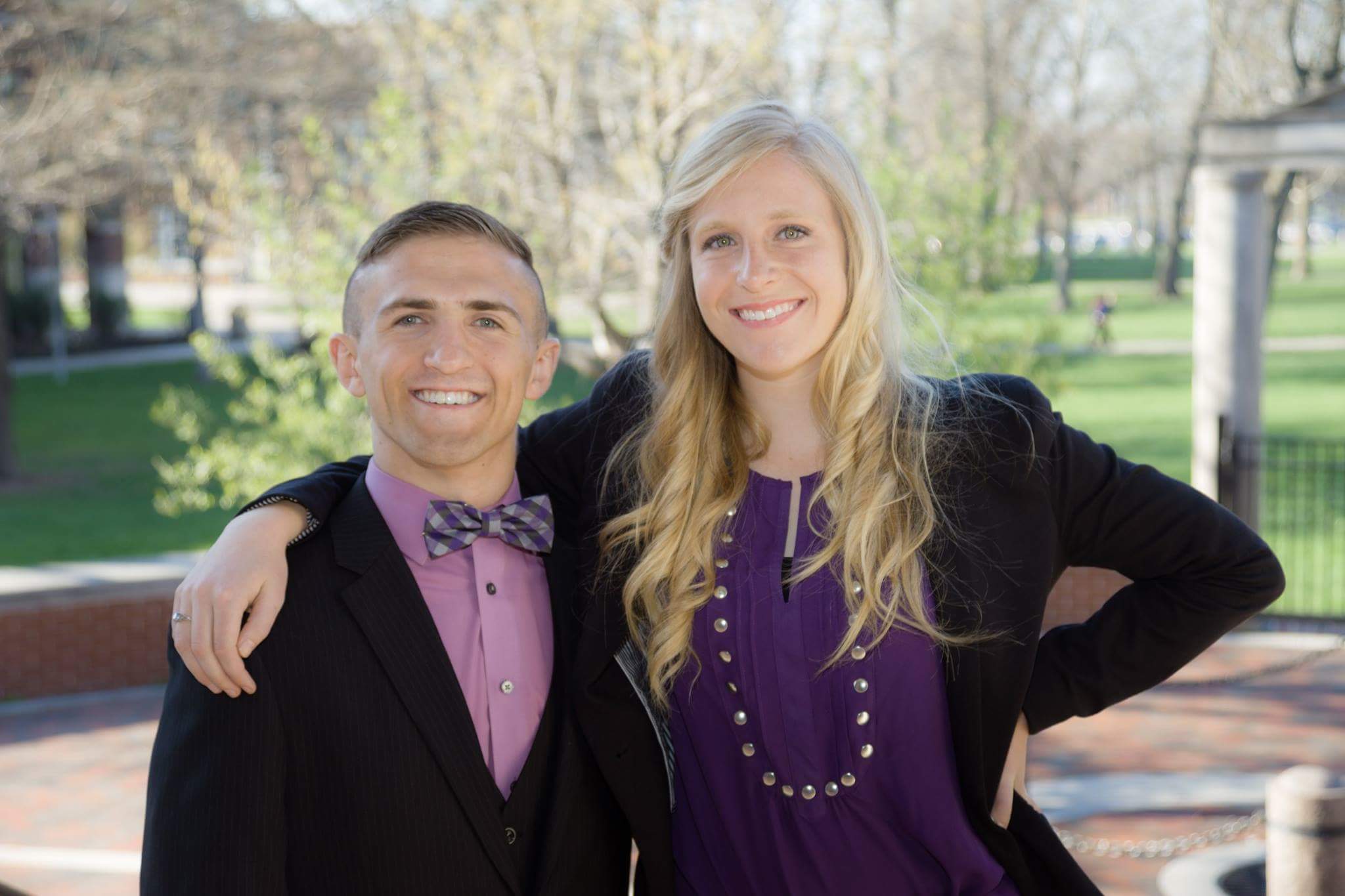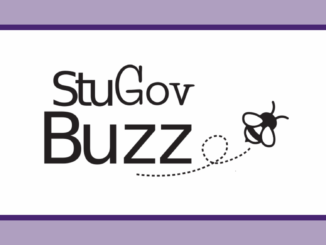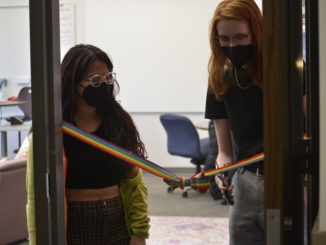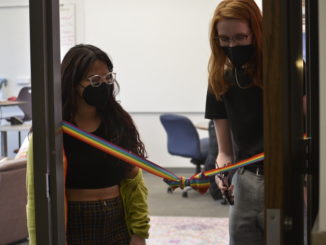
Zack Irvin: How excited are you to have been elected to your position?
JJ Dorrell: I am very excited. I have been involved in Student Government for the past four years. Next year will be my fifth year because I am a redshirt senior because of athletics … I thought it was my time to finally step up. I was vice president last year and, you know, I think it was the right time to finally take this position. Christy [Crouse] and I talked about it, and we felt like we would make the strongest ticket and I’m extremely excited for the next year and the opportunities it holds.
Christy Crouse: I’m also super excited. I think something that feeds my excitement is a lot of people on campus kind of pushed for me to run. And now I am seeing why that I have been talking to a lot of people, and they’re finally like, “Really push this,” or “We can work on that.” And so I am excited to do a lot of the things that we said we were going to do. Also, I think [Dorrell and I] work really well together, and so that is something to be really excited about because we can get things done efficiently and make a big difference.
ZI: What made you decide that you two would be the best duo to campaign as?
JD: As Christy said, we just work really well together. We started talking this year at the beginning of the year and started building a relationship from there. And as just the time came toward election season … Christy was thinking about running — we were all thinking about it, and what is the best way to represent the Truman State University student body. And like the best we saw fit was how we ran … I think Christy and I both really care about the students here and really want to try and represent them and do what is best for them. And we thought running together would be the best choice.
CC: I think we represent very different sides of campus, too. We are involved in completely different things, and so Student Government is what actually brought us together. I don’t know if we would have known each other otherwise, but that does represent that we do represent a lot of the student body — like a breadth — because we are involved in so many activities that really reach a lot of people, so we thought that would be good because we have diverse abilities.
ZI: Why is it important to you to be involved in Student Government?
JD: I think it is important because Student Government makes a lot of decisions that affect campus in various ways, and, I mean, we are the voice of the students to Faculty Senate, Board of Governors or just really anybody else for that matter … Being the voice for the students and representing them is really important. I mean, the question was why it’s important to be, and that is to really just voice the student opinion.
CC: My position this past year was diversity chair on Student Government, so a lot of issues have come about on different campuses about diversity, and so I know it is pretty urgent that a lot of things need to happen — so not only just listening to people. A lot of times, I think people think Student Government is involved in just little things on campus people have problems with, but some things are pretty important that call for urgency that I think, as students, we can really represent that and bring it to light — especially to the administration. And so that is why I feel a calling, because I am passionate about it, and so I think that will really show itself through my leadership abilities in Student Government.
ZI: Who do you see yourself patterning as when it comes to running your position?
JD: That is a good question, I mean a quick one that comes to mind is [senior] Molly Turner. She was the most previous body president, and I was her vice president, and she did I felt a really good job, getting a lot of resolutions passed and meaningful resolutions. I think probably [she had the] most visible Student Government we have had in the past few years. I know most students have at least gotten two or three surveys from us, and we really wanted to get that student opinion and make sure we were making the right choices for the student body. If that was with the conceal and carry legislation going on at the capital or with the LGBTQ Resource Center, which Christy has been pretty much spearheading herself. And so it is one of these things that really wanted the student opinion, and I think Molly did a really good job and I mean there are other leaders but to answer the question for now, it is Molly.
CC: For me I don’t know if there is a specific leader I try to model after, but I definitely think one the theories I look at the most is the authentic leadership theory, which talks about following your inner compass and not sacrificing your inner values for the pressures around you or the people talking in your ear, which is a lot of what happens with the politics of Student Government. So for me this year there were some issues that came to me that were really controversial, so I had to think, “Am I willing to not work on this issue because I’m going to get some push back or is that something I would like to follow?” Some of the theories that have been brought about that say this is a good way to lead and make positive change and feel good about it yourself. I think that is with the authentic theory so I really try to employ that when possible.
ZI: Where does your passion to be involved come from?
JD: I think mine would go all the way back to my parents. I know my parents always wanted to push me, and you know, being short statured, they were like, “Don’t let anyone ever tell you what you can’t do.” And so it is one of those Those? Check source things that has always resonated with me. My mom is like, “You can do that,” and I am like, “OK, let’s try it out.” I mean, I was the student body president of my high school, and I took various leadership roles throughout grade school. And then to now, it is one of these things that being a leader in time has evolved me to where I am at today. So all the way back to my parents and them always pushing me to be the best person I can be.
CC: For me there is a couple of things. For one my faith and tradition. Being a Christian, I really want to push those values forward and act on that. I think a lot of the problem with society is a lot of people have values but don’t actually try to do things about them. So that is my inner drive from a lot younger. And also, my church community pushed me to be a leader in our church from when I was really young, so that helped a lot. But then, also, both JJ and I went to Missouri Girls State and Missouri Boys State in high school, and we were both elected to lieutenant governor, which is like the second highest position and it was kind of random that we both had those positions. But for me that was a really big learning experience to where I was like, “Wow, I can get elected. I can succeed if I want to.” And that kind of started my trajectory to … work in the political sphere and do something.
ZI: How has your time at Truman and in the Senate prepared you for these positions?
JD: Well since I have been on the body forever, I am the longest sitting member … I have seen almost everything. And so when a topic or issue arises, even if it is not exactly the same as it happened three years ago, it is still similar. I can look back and see how that issue was handled then and find out and resolve a way to handle that issue now. So I guess it would just be experience.
CC: I have had less experience. I’m in my third year, so for me it’s been in those experiences I have tried to make the most and connect with a lot of leadership on campus. And so I think that has really prepared me. Especially as diversity chair, I connected with the Multicultural Affair Center and have a really good relationship there. And so those connections really make us a valuable resource as leaders — to be able to point people in the direction of like, OK you want to make this change, let’s try and connect you with this person and then get that done. That is a place where the Senate has really helped me become prepared to lead now.
ZI: When was your most difficult time being a leader?
JD: I would say not a particular time, but I would say when you’re not always with the popular majority. Whatever you’re leading or believing in or what your moral values tell you to follow might not always be the popular thing to do. It’s when you have to stick to those values that have gotten you to where you are, and it’s getting the resistance from everyone that doesn’t like what you are trying to do. I really think that’s what sets good and bad leaders apart, and that is a hard thing to do, I think, is when people are against you but you still hold to your guns.
CC: Mine goes off of that, actually this past year I wrote a resolution at the beginning when I was starting and it seem like everyone supported it, but then the next time when we brought it up to vote on, there was a lot of dissent so it ended up not being passed. But I had spent a lot of time working on it — I invested a lot, so I ended up kind of sucking up my pride, which you have to do as a leader a lot, and talking to that person that was the main person against it. It ended up working out great because we rewrote the resolution in a way that everyone was okay with it and it ended up passing unanimously but it was a really difficult experience to go back and say, “OK, I’m really mad that you did this,” but to move forward.
ZI: What do you do to stay motivated when it seems like everyone is against you?
JD: Staying positive and also communicating. You know, talking to those people, like Christy will probably say, she had to swallow her pride and really talk. She met with all the people that were against that resolution, and she talked it out and made it to where that resolution was unanimously passed the next week. It’s just one of those things with communication and I mean staying positive I think you can get through adversity.
CC: I think sometimes you [are] stuck with a lot of work as the leader, and so for me sometimes that can be like you’re swamped and don’t know where to go. So reaching out for help and trying to get more people involved — sometimes you don’t want to do that, but you kind of have to. And I found that like during Diversity Week this week, where we had like seven events that our committee was doing. And I was kind of the leader of all of them and kind of felt like I was doing everything. So really reaching out to the committee members and just people around me, saying, “Can you please help me?” And it worked out a lot better that way.
ZI: How do you plan on accomplishing your campaign platform?
JD: I think also with the experience — and like Christy saying earlier — we have a lot connections around campusAround campus? Check source and we really don’t overlap in many places. So having these connections all around campus and really keeping those lines of communications open with everyone throughout campus and with all of our platform ideas, we know who to go to and hopefully get that thing started. And with our platform we didn’t have 40 ideas — like we didn’t promise 40 things because we wanted to be realistic, and I think our platform is extremely realistic. I think everything that we said on there was something that can be done for next year, or if not, something that we could start the planning processes. Hopefully future Student Governments can keep going from there.
CC: So we have the committees that all our platform ideas really fit in with what the committees on Student Government do. What we are hopefully going to be doing is providing those ideas to those committees. And then as vice president, I oversee these committees so making sure these things are being worked on. An example of a platform idea that we are already working on is that we said we wanted to more integrate international week with Truman week, which Truman Week is looking a little bit differently, but we have already met twice with faculty and our staff mentor to talk about how Truman Week is going to look. And I have already planned to go meet with the director of the international students to ask her is there a way that we can partner on events. So that is kind of how it works, when things start coming up you take the steps to act on it.
ZI: Our campus has faced a lot of changes this last year and seen a lot of activity out of Student Government with what is happening nationally and locally within the community. With that in mind, what role on campus do you see Student Government playing next year?
JD: Staying on the forefront on those type of issues. Diversity and inclusivity are something Christy and I ran on to really unite this campus. It’s one of these things that, being so important always but definitely during this time now, as Student Government leaders we are the ones that are going to have to bring Be bringing? to bring? Check source that up and really push for that. So I know Christy being the chair of diversity, she worked a lot this year, so she is going to have more to say on this than I do. So that is something we ran on, and it is important to us to really stay on the forefront of that.
CC: So there are a couple of things. The student opinions and surveys and everything that we have been doing this year, I actually think that has been really helpful in terms of helping students feel like their voice is heard about these issues. So, like guns on campus, that was a big thing going through the Missouri Senate, so that was something that we needed to bring forth so people could talk about it. Because if we don’t, then something could happen that could affect the student body. So keeping that communication helps people feel like that something is being done with issues around them … We are listening to what is going on and trying to act on it.
ZI: So when a student has a problem or issue, how can they make their opinion known to the Senate?
JD: I would say, if you knew who was on Student Government to approach one of them. There are a lot of others ways. Another way would be to go to our office hours. There is a senate office in the SUB. It is in the CSI complex on the bottom floor. We are open 8:30 to 3 p.m. Monday through Friday. We also have a Facebook page — you can message us on there, and we usually respond within a day. And we have a website — It’s senate.truman.edu, and you can also ask us a question on there and we usually respond within [24 hours].
CC: A lot of our information, in the past couple years, we found on social media just looking at comments people say or on YikYak we see someone saying something. So the representatives and us are trying to stay in tune with what people are saying even if it is not directly to us. So that is one thing we try to do. But also we ran on our platform we had a coffee with the president we talked about doing. So I think like bi-weekly or weekly, I’m not sure we have set it in stone yet, but we would have a place where people can come and bring things that throughout the week or year that they have seen and tell that to JJ. It’s kind of modeled off of what Dr. Paino did. So yeah, trying to keep that line of communication open.
ZI: Is there anything else you feel we should know?
JD: We are both excited and ready for this new year and really ready to enact some of the changes we have on our platform.
CC: We want as many people to be involved as possible, so we would say anyone on campus who have any ideas, we are always open. Both of us are really flexible to new ideas. So yeah, we are just really excited.
This story originally appeared in the April 21 edition of the Index. Be sure to pick up a copy on newsstands now.





